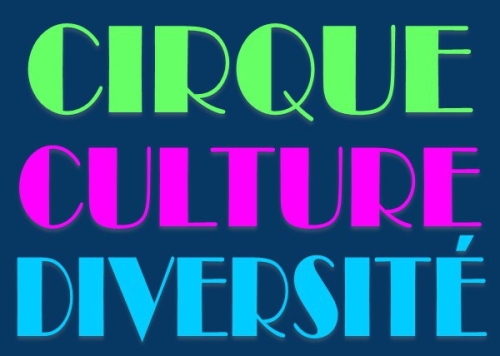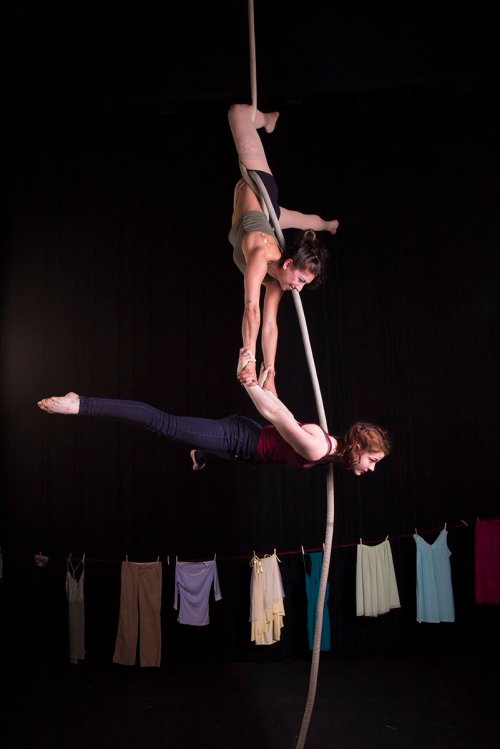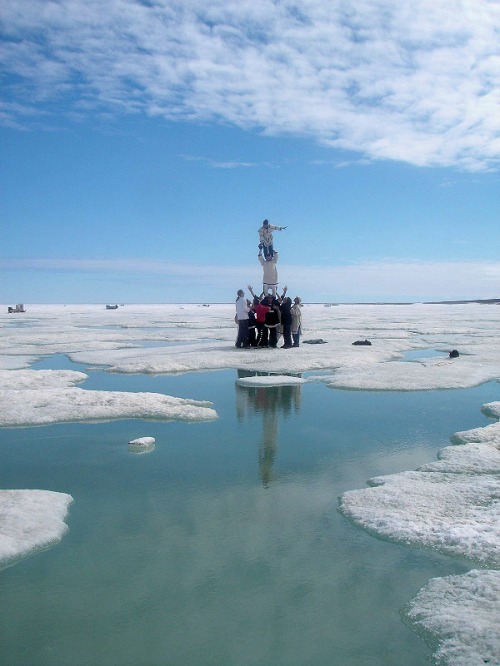“Big results require big ambitions”- Heraclitus

On July 14th, I co-facilitated with Nicki Miller (Only Child Aerial Theatre) a round table discussion on equity and diversity in contemporary circus presented as part of the OFF MICC.
Diversity has become a hot-topic at the Montreal Complètement Cirque Festival over the past couple of years. Last year, in the context of the festival, the Montreal Working Group on Circus, led by Louis Partick Leroux facilitated “Encounters with Circus and its Others”, and this year Andréane Leclerc, Angélique Willkie, Éliane Bonin, Dana Dugan and Miriam Ginestier co-produced Cirque OFF which sought to “assemble and advocate for an environment of candid expression and the exchange of ideas
to liberate the circus form and foster agency.” (http://www.cirqueoffmtl.com/mission.html)
Although each of these events had their own unique presentation models, they both featured professionals of the circus community in North America who are seeking an evolution of the art form to include a broader range of artists, performances and opportunities.
Nicki and I had a similar objective with our panel discussion.
We assembled a panel of presenters including:
Dana Dugan (Concordia), Alisan Funk (Concordia & ENC), Susie Williams (Acrobatic Conundrum), Joseph Pinzon (Founder and Creative Producer of Short Round Productions), Thomas Lenglart (Cirque Eloize), and Guillaume Saladin (Artcirq)
Our main goals were to
- Define what diversity in circus includes.
- Identify ways we embracing diversity in circus.
- Where have we seen progress so far?
- What have been our limiting factors towards further growth?
- Destigmatizing diversity as a subject and opening the conversation for further public discourse.

Photo by Wittypixel Featuring: (top) Xochitl Sosa and (below) Ellie Rossi- Acrobatic conundrum
Can white people talk about diversity?
We did our best to have as diverse a panel as possible, but there was one problem… We had a glaring lack of representation of people of colour, receive some criticism. I was told flat-out by one participant that as a white person “you have no idea what it’s like being perceived as a minority, and you don’t really have the right to talk about these issues”.
Which got me thinking… Can white people talk about diversity?
For one, I don’t know a lot of circus artists who aren’t white. Admittedly, this was one of my motivating factors for creating this discussion in the first place, but it did create a problem when trying to find panelists and audiences members of colour. I relied on my friends on Facebook and a handful of recommendations from peers to find panelists and attendees. I had contacted other circus leaders in the industry who recommended some people of colour, but many were on tour, or could not attend. We had no budget or stipend to offer artists traveling from abroad. The result was that we only had one panelist who was not Caucasian.
“I recognize that I am privileged, and as such I am compelled to make an effort to use my privileged and my voice to have an influence in my community.”
Secondly, as a privileged white person I don’t know, and I will never know what it is like to be a part of a cultural minority, therefore I cannot genuinely empathize with the issues and struggles a person of colour faces on a daily basis. However, I recognize that I am privileged, and as such I am compelled to make an effort to use my privileged and my voice to have an influence in my community. My objective with the panel was to create a space for people who felt they were not being represented or supported by the circus community due to their difference and to create a dialogue about how we can create more depth in the circus domain looking forward.
Despite a lack of representation of people of colour, our panel was made up of 50% women, 50% men; 3 Americans, 2 Canadians and 1 dual citizen; 2 queer, 3 straight and 1 non identified person. We also made sure to include people from different backgrounds including circus performers, educators, producers, casting directors and social circus facilitators.

Photo credit: Artcirq Iglookik 2005
We were not only speaking of diversity of cultural representation on stage, but also varieties of gender, race, and cultural perspectives) and in artistic aesthetic (theatrical tools, circus disciplines).
“I choose to use that influence to discourage systemic disadvantages and promote the inclusion of any person, regardless of their race, gender or sexual orientation.”
We asked our attendees to share with us where they wanted to see more diversity in circus. Some of the responses include:
- Gender roles
- Subject matter- beyond love stories with a male counterpart
- Transparent, responsible, reflective processes of creation
- Educate circus audiences of different, less commercial forms of circus
- More diversity of preparatory circus education
Growing up with privilege, I have been taught that I have an influence over the way things work out. This is a great gift. Personally, I choose to use that influence to discourage systemic disadvantages and promote the inclusion of any person, regardless of their race, gender or sexual orientation.
“Through this panel I hoped to share the insights I have gained about diversity with my artistic peers.”
Yes I am white, but I support diversity and celebrate difference.
I wear many hats, and one of those is as an administrator at McGill University. Through this role I have learnt about various admissions process and outreach projects that have been established by the university in an attempt to diversify the student body. Through this panel I hoped to share the insights I have gained about diversity with my artistic peers.
Would it be ideal to have people of all different type of cultural backgrounds, sexual orientations, genders and abilities facilitating and attending these events? Absolutely!
I hope that the panel discussion inspired many more conversations. By producing this one event I have been exposed to so many more artists from different backgrounds and I look forward to including/ supporting them.
“[…] please educate me!”
And if you’re reading this and you are a person of colour, or any minority for that matter, please educate me! Share your experiences with me and let me know how I can help support your voice.
The event cirque culture & diversité/ circus culture & diversity had just over 20 local artists in attendance and over 30 people have viewed our live-stream to-date.